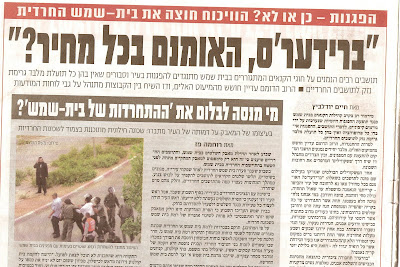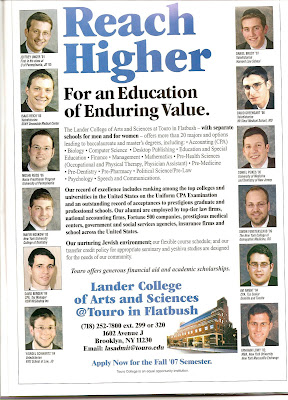Jonathan Rosenblum wrote an article
On Making Money where he writes that he admires businessman more then professionals. The more I think about this article the more it bothers me.
First of all we need to understand the context. The Charedi world is fighting very hard for a Torah only curriculum, no secular studies and certainly no college. Without a secular education the only option is business. There is no doubt that this is one of the (if not the main) motivations for the article.
The main theme of the article is that businessman are better people and have more emuna then professionals.
The obvious implication is that Jewish boys should go into business and not a profession.
I think this is incorrect for a number of reasons and in fact against the Gemara.
The Gemara in Kiddushin (30A-B) writes
חייב אדם ללמד את בנו אומנות
A person is obligated to teach his son a tradeThe Gemara has a dispute whether teaching your son business fulfills this obligation. According to R' Yehuda it does not. In other words, according to R' Yehuda it is explicit that being a professional/tradesman is preferable to being a businessman.
The Mishna later (82a) says
ר' מאיר אומר לעולם ילמד אדם את בנו אומנות קלה ונקיה
A person should teach his sons an easy and clean professionThe Gemara gives specific examples of trade not business.
We see clearly that Chazal's preferred occupation was a profession/trade not business.
He quotes the following from a Satmar Chasid
"An education is helpful for earning a living, but it’s irrelevant if you want to make MONEY." He made clear that he preferred the latter.It seems that he agrees with this statement.
IMHO, this statement is hashkafically wrong for a number of reasons.
A person has a mitzva to support his wife and family (read your כתובה). There is no mitzva to get rich. The person who works to make a living is מקיים a mitzva, the person who works to get rich is not.
We believe that wealth comes from Hashem and therefore, if Hashem wants you to be wealthy you will be wealthy as a professional, and if he wants you to be poor you will be a poor businessman. The statement of the Satmar Chasid stinks of כחי ועוצם ידי, you can't get get rich unless you are in business.
In fact this is an explicit Mishna in Kiddushin (82a). The Mishna states
ר' מאיר אומר לעולם ילמד אדם את בנו אומנות קלה ונקיה ויתפלל למי שעושר והנכסים שלו שאין אומנות שאין בא עשירות ועניות שלא עשירות מן האומנות ולא עניות מן האומנות אלא הכל לפי זכותו
A person should teach his sons an easy and clean profession and daven to the one to whom wealth and property is his (hashem) because there is no profession/trade that doesn't have rich people and poor people, as riches are not base don the profession nor is poverty, rather everything is based on your meritsThe Mishna says explicitly that money comes from heaven and whatever profession/trade/business you will get what you deserve.
He claims
Businessmen are far less likely to attribute their success solely to their own abilities. His view of professionals is very outdated. In my father's generation a person got a job at a big company or the government and was set for life. Today it is just not so. People lose their jobs through no fault of their own.
This personally happened to me. I worked for a large company and was doing quite well. I had a very good relationship with my manager and had good performance ratings. However, in the end none of that helped me. The company was losing money and therefore, decided to close down the product I was working on. One day I came to work and they told all of us in that group that we were laid off. It didn't matter if you were a superstar or a regular employee, everyone was gone. This taught me a tremendous lesson in emuna at least as much as a businessman.
In his praise of businessman he leaves out a few very important points.
For every story of a businessman making it, there are 9 stories of businesses closing down or going bankrupt. 9 out of 10 small businesses fail.
Running a business can be very challenging in terms of keeping halacha and acting ethically. There is a famous story about a shochet who came to R’ Yisrael Salanter and said he doesn’t want to be a shochet anymore the responsibility is too great. Instead he wants to open a store. R’ Yisrael told him that he is making a big mistake. A storekeeper has a much bigger responsibility vis a vis halachic obligations and responsibilities then a shochet.
Running a business is more then a full time job, it can easily take over your life. Many professionals on the other hand are able to devote a few hours a day to learning Torah.
Last but not least, he writes
Perhaps the maxim “buy cheap sell dear” is genetically encoded in many Jews.
...
That hondling gene ...If a non-Jew had written these words Rosenblum would be the first one screaming anti-semitism.









